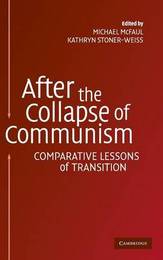
|
After the Collapse of Communism: Comparative Lessons of Transition
Hardback
Main Details
| Title |
After the Collapse of Communism: Comparative Lessons of Transition
|
| Authors and Contributors |
Edited by Michael McFaul
|
|
Edited by Kathryn Stoner-Weiss
|
| Physical Properties |
| Format:Hardback | | Pages:274 | | Dimensions(mm): Height 229,Width 152 |
|
| ISBN/Barcode |
9780521834841
|
| Classifications | Dewey:320.94709049 |
|---|
| Audience | | Professional & Vocational | |
|---|
|
Publishing Details |
| Publisher |
Cambridge University Press
|
| Imprint |
Cambridge University Press
|
| Publication Date |
6 September 2004 |
| Publication Country |
United Kingdom
|
Description
This collection of essays is the result of a conference convened at Princeton University marking the ten year anniversary of the collapse of the Soviet Union. Some of the best minds in post-Soviet studies focused on the task of identifying in what ways the post-communist experience with transition has confirmed or confounded conventional theories of political and economic development. The result is a rich array of essays examining vital aspects of the transitional decade following the Soviet collapse and the comparative lessons learned. These essays explicitly tally the gains and losses to post-Soviet countries of the last ten years as well as comparing the post-Soviet experience implicitly and explicitly with that of other developing countries. Each essay blends political science theory with fresh empirical analysis.
Author Biography
Michael McFaul is the Peter and Helen Bing Senior Fellow at the Hoover Institution. He is also an associate professor of political science at Stanford University and a non-resident associate at the Carnegie Endowment for International Peace. Before joining the Stanford faculty in 1995, he worked for two years as a senior associate for the Carnegie Endowment for International Peace in residence at the Moscow Carnegie Center. McFaul is the author and editor of several monographs including Russia's Unfinished Revolution: Political Change from Gorbachev to Putin, Russia's 1996 Presidential Election: The End of Bi-Polar Politics with Tova Perlmutter, and Privatization, Conversion and Enterprise Reform in Russia. His articles have appeared in Constitutional Political Economy, Foreign Affairs, Foreign Policy, International Organization, International Security, Journal of Democracy, Political Science Quarterly, Post-Soviet Affairs, and World Politics. Kathryn Stoner-Weiss taught in the Politics Department and at the Woodrow Wilson School at Princeton University before becoming the Director of the Russia and Eurasia Project at the Liechtenstein Institute on Self-Determination at Princeton's Woodrow Wilson School of Public and International Affairs. Work has been funded by the Smith Richardson Foundation, the Carnegie Corporation of New York and Princeton University's Center of International Studies. She is a frequent traveler to Russia and the former Soviet Union. Her other books include Local Heroes: The Political Economy of Russian Regional Governance (Princeton University Press, 1997) and Resisting the State: Reform and Retrenchment in Post-Soviet Russia (Cambridge University Press, forthcoming).
Reviews"Michael McFaul and Kathryn Stoner-Weiss have edited a stimulating volume in which leading political scientists working on the former Soviet Union demonstrate the utilit of a sophisticated combination of post-Communist area expertise and comparative social science methods. Although the editors describe the book as a 'sampler' of cutting-edge work by top researchers, the volume in fact coheres very nicely around two central themes: state building and regime transition." Political Science Quarterly, Henry E. Hale, George Washington University "As a concise and stimulating overview of the theoretical opportunities opened up by the collapse of Communism...this book succeeds admirably." - The Russian Review, Conor O'Dwyer, University of Florida "Exceptionally rich collection of essays...this volume embodies political science research at its best, both theoretically and methodologically aware, and sensitive to the cases and their problems." The Slavic Review Neil Robinson, University of Limerick, Ireland
|